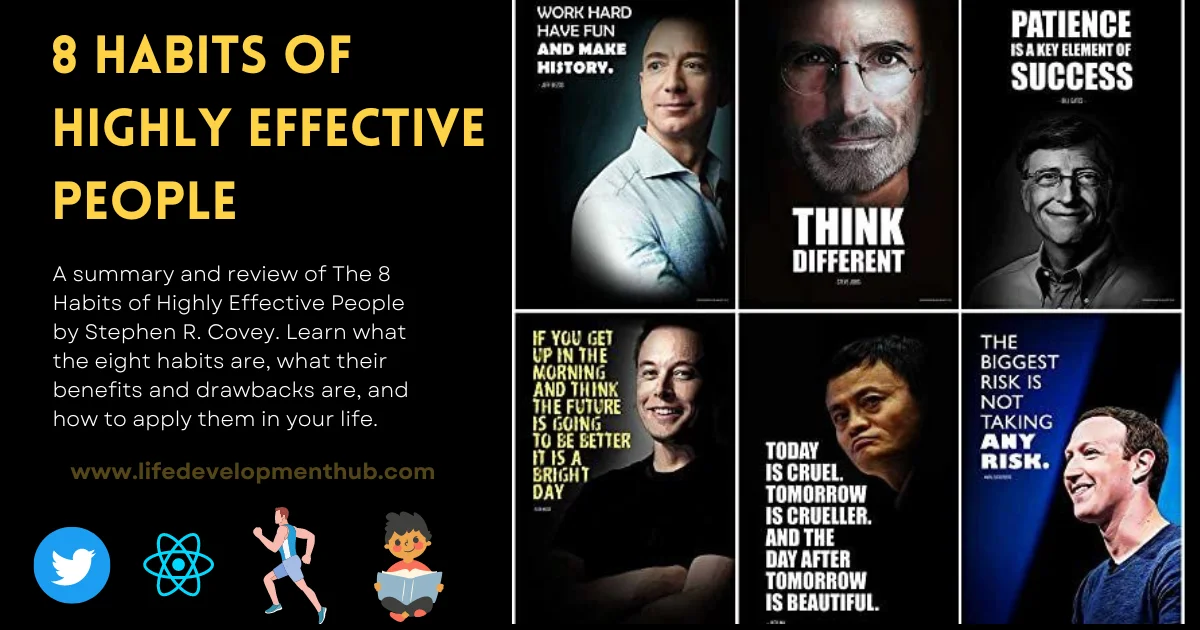A summary and review of The 8 Habits of Highly Effective People by Stephen R. Covey. Learn what the eight habits are, what their benefits and drawbacks are, and how to apply them in your life.
Do you want to live a happier and more successful life both personally and professionally? If so, The 8 Habits of Highly Effective People by Stephen R. Covey could be just what you need.
The 8 Habits of Highly Effective People was released as a follow-up to 1989’s best-seller The 7 Habits of Highly Effective People and has sold more than 15 million copies worldwide. Based on his or her study and work as a leader, teacher, or consultant; its author wrote the book using material drawn from their study and experiences accumulated throughout life as an author, teacher or consultant – it has now been written in 38 different languages!
In this piece, we’ll outline the book’s key ideas and discuss what makes it both good and bad. Furthermore, we will show how you can apply these eight habits into your daily life.
What are the eight habits of highly effective people?
In “The 8 Habits of Highly Effective People,” author Stephen Covey describes eight traits common among successful and happy individuals. These are:
Habit 1: Take Charge. By this I mean taking responsibility for your own life and refusing to blame other people or events for your issues. In addition, making decisions based on beliefs and goals instead of your moods or impulses will allow for more stability in how and what decisions are made.
Habit 2: When setting goals for yourself, always begin with an end in mind. Knowing precisely what it is you want out of life and setting an achievable plan should reflect this goal; similarly, actions should reflect what’s best for you rather than being dictated to by others.
Habit 3: First take care to address what’s most pressing. That means prioritizing your jobs and activities based on how important and urgent they are rather than how convenient or comfortable they might be, not how quickly or conveniently they can be completed. Also consider making full use of your time and energy by not spending it on distractions or postponing commitments.
Habit 4: Think about how everyone can win, this means always working towards helping other people and not trying to take advantage of others for your own gain. Also, treating both yourself and others with kindness; not being self-serving or insecure are also keys components.
Habit 5: Focus on understanding before seeking to be understood. This means listening carefully and listening without presuming to know what other people need or feel before providing your viewpoint or needs. Furthermore, speaking clearly and politely instead of being unclear or rude are also ways of creating good rapport with those you interact with.
Habit 6: Work together. Working together means not competing against or isolating yourself from others, but cooperating to accomplish more together than you could alone. Working together also means appreciating differences and innovation instead of fearing or being intolerant toward them.
Habit 7: Maintain a Sharp Saw This means taking care to address your physical, mental, social, and spiritual wellbeing in an all-round fashion without neglecting any aspect of it. Furthermore, this means being free from stress or boredom by finding balance and joy in life.
Habit 8: Find Your Voice and Help Others Do the Same This means discovering and using your unique skills and interests to make the world a better place, while equipping others to do so by acting as role model, mentor, teacher or leader.
What can the 8 Habits of Highly Effective People do for me?
Stephen R. Covey asserts that developing and adhering to eight habits will benefit you in numerous ways:
Your life will become more in your control and less dependent upon others.
Your goals will become clearer, and there will be less confusion or disorientation.
And finally, productivity and efficiency will increase dramatically and chaos reduced significantly in your daily routine.
Your life will become richer with good relationships and teamwork while diminishing disagreement and loneliness. Furthermore, confusion and anger will subside and understanding and kindness will grow instead.
Finally, creativity will increase as new ideas flow to you more freely without feeling stuck or like everyone else.
– By becoming more powerful in life and less stressed out or bored by its circumstances, you will experience less stress, boredom and more happiness and satisfaction in your everyday experiences. By developing more power and influence than before and less meaninglessness or failure will follow suit.
What are the 8 Habits of Highly Effective People’s downsides?
Even though this book has received many positive reviews and comments from people stating it improved their lives, [3]there are also a few downsides you should keep in mind before reading it.
Some of the problems include:
– The book takes an American viewpoint, so may not apply in other countries or situations. Additionally, its casual tone may not suit readers who prefer an academic or professional tone.
– This book does not offer anything truly new or original; its ideas and concepts were borrowed heavily from other authors such as Stephen Covey’s father, Covey himself, Dale Carnegie and Viktor Frankl.
– This book does not cite any evidence to back its claims and ideas, leaving only itself as evidence.
– Unfortunately, the book doesn’t address many of the challenges or hurdles people might encounter when trying to follow its habits, such as money issues, legal complications or moral dilemmas.
How can the 8 Habits of Highly Effective People help in my life?
Here are a few tips that may assist you if you choose to read this book and implement its habits into your everyday life:
Read the book with an open mind and critical eye, rather than with blind faith or skepticism.
Don’t try to adopt all the habits at once – instead pick one or two that make the most sense and work on them gradually.
Do not expect instant or dramatic results – be patient and persevere to see the fruits of your labors! Don’t compare yourself with others but rather be honest and kind toward yourself while learning from any mistakes made along the way.
Do not go it alone; seek assistance and feedback from people who share your goals or values, such as friends, family, mentors or coaches.
Stephen R. Covey is an individual.
Stephen R. Covey was an author, speaker, teacher and businessman from the United States. He was best known as author of The 7 Habits of Highly Effective People; also serving as co-founder and vice-chairman for FranklinCovey which provides training and coaching services to individuals and companies worldwide.
How are The 8 Habits of Highly Effective People different than The 7 Habits of Highly Effective People?
A: The 8 Habits of Highly Effective People is the sequel to The 7 Habits of Highly Effective People. It extends the concepts and practices from its predecessor and introduces one new habit essential for being great in 21st-century society – finding your voice while supporting others to find theirs.
Q: Are the 8 Habits of Highly Effective People suitable for beginners or experienced users? A: Both levels will find it useful.
A: Anyone seeking to improve their personal and business lives can benefit from reading The 8 Habits of Highly Effective People. It covers basic concepts as well as advanced topics, while offering useful practical advice that everyone can utilize.
At its core, The 8 Habits of People Who Get Things Done is a self-help book designed to teach readers how to make more out of life by developing beneficial habits and adopting positive attitudes. Reading it has many advantages such as becoming happier, more productive and self-assured – though if you wish to incorporate its teachings fully into your everyday life it requires commitment and following certain guidelines and regulations.

